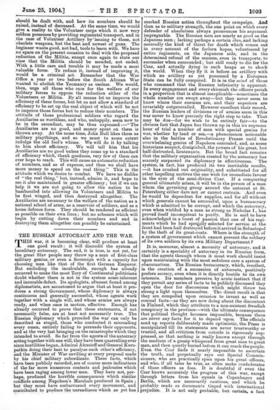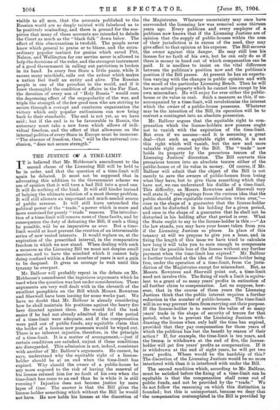PHIS war, it is becoming clear, will -produce at least
one good result : it will discredit the system of hereditary autocracy. The end, it is true, is not yet, for the great Slav people may throw up a man of first-class military genius, or even a Sovereign with a, capacity for choosing men like that of the first German Emperor. But excluding the incalculable, enough has already occurred to make the most Tory of Continental politicians deubt whether there is not in the system some inherent and incurable defect. Its apologists, oftenest found among diplomatists, are accustomed to argue that at least it pro- duces a strong Government, whose diplomacy is always continuous and generally successful, whose agents work together with a single will, and whose armies are always ready, and when once in motion, effective. Enough has already occurred to prove that these statements, if not necessarily false, are at least not necessarily true. The Russian diplomacy which preceded the war can only be described as stupid, those who conducted it misreading every omen, entirely failing to persuade their opponents, and at the very last bringing on the catastrophe which they intended to avoid. So far from the agents of the autocracy acting together with one will, they have been quarrelling ever since hostilities began, Admiral Alexeieff and General Kuro- patkin doing their best to paralyse each other's efficiency, and. the Minister of War cavilling at every proposal made by his chief military subordinate These facts, which have been publicly recorded, are of course mere indications of the far more numerous contests and jealousies which have been raging among lower men. They have not, per- haps, produced the horrible consequences which. similar conflicts among Napoleon's Marshals produced in Spain ; but they must have embarrassed every movement, and contributed to produce the unreadiness which as yet has , marked Russian action throughout the campaign. And then as to military strength, the one point on which every defender of absolutism always pronounces his argument impregnable. The Russian men are nearly as good as the Japanese men ; lacking perhaps a certain élan, and lacking assuredly the kind of thirst for death which comes out in every account of the forlorn hopes, volunteered by entire regiments, on the Japanese side, and in the determined refusal of the seamen, even in transports, to surrender when surrounded ; but still ready to die for the Czar, and actually dying in such heaps as to shock the world. When they fly it is before an artillery with which no artillery as yet possessed by a European State can be fully compared. It is in the mind of those who command that the Russian inferiority is apparent. In every engagement and every skirmish the officers perish in a proportion that is almost inexplicable—sometimes the whole number are swept away—but they never seem to know where their enemies are, and their superiors are invariably outgenoralled. However excellent their record, the Russian leaders of divisions or of armies seem in this war never to know precisely the right step to take. That may be due—for we wish to be entirely fair—to the obvious fact that Japan has thrown up in this its supreme hour of trial a number of men with special genius for war, whether by land or sea,—a phenomenon noticeable also in the battles of Revolutionary France until the overwhelming genius of Napoleon concealed, and, as some historians suspect, diminished, the powers of his great, but half-distrusted, lieutenants. But the broad fact remains that the military organisation created by the autocracy has scarcely surpassed its diplomacy in effectiveness. The eystem, in fact, has produced its two inevitable results, —it has crushed out originality, and substituted for all other impelling motives the one wish for immediate favour in the eyes of the semi-divine Czar. If a conquering general ultimately arises, it will be in the person of a man whom the governing group around the autocrat at St. Petersburg either dare not or cannot restrain. .And even he would be dependent for supplies, and for all without which generals cannot be successful, upon a bureaucracy, which is admitted to be corrupt, and which the autocracy, even when wielded by a man as strong as Nicholas I., has proved itself incompetent to purify. He is said to have acknowledged in a burst of passion that one of his regi- ments which he had specially selected for service at the front had been half destroyed before it arrived in Sebastopol by the theft of its great-coats. Where is the strength of a system of government which cannot prevent the robbery of its own soldiers by its own Military Department It is, moreover, almost a. necessity of autocracy, and it certainly is a speciality of autocracy in its Russian form, that the agents through whom it must work should insist upon maintaining with the most sedulous care a system of obscurantism. The Russian bureaucracy, which, recollect, is the creation of a succession of autocrats, positively prefers secrecy, even when it is directly hostile to its own interests. Its members perceive by acute instinct that if they permit any series of facts to be publicly discussed they open the door for discussions which might throw too strong a light upon themselves. The direct result is that they are compelled upon occasion to invent as well as conceal facts—as they are now doing about the discontent in Finland, which they attribute to a non-existent Swedish conspiracy in the province—with the ultimate consequence that political thought becomes impossible, because there are never any facts for it to depend upon. The officials send up reports deliberately made optimistic, the Press is manipulated till its statements are never trustworthy or trusted, and all criticism from outside is rigorously sup- pressed, so that nothing is really known except through the medium of a gossip whispered from great man to great man, and then quietly buried before it can reach the people. Even the Czar finds it nearly impossible to ascertain the truth, and perpetually rays out Special Commis- sioners, who are practically spies upon his great officers, and who, if all tales be true, as often make confederates of those officers as foes. It is doubtful if even the Czar knows accurately the progress of this war, except through letters from his equals in Copenhagen and Berlin, which are necessarily cautious, and which he probably reads es documents tinged with international prejudice. It is not only probable, but certain, a fact visible to all men, that the accounts published to the Russian world are so deeply tainted with falsehood as to be positively misleading, and there is ground for the sus- picion that many of these accounts are intended to delude the Court as much as the "black folk" down below. The effect of this obscurantism is twofold. The people never know which general to praise or to blame, and the extra- ordinary popular instinct for genius which saved Pitt, Nelson, and Wellington for our service never is allowed to help the decisions of the ruler, and the strongest instrument of a good Government in calling out patriotism is broken in its hand. In every free State a little panic, while it causes many mischiefs, calls out the ardour which makes a nation feel itself an entity and alive. The Russian people is one of the proudest in the world, and if it knew thoroughly the condition of affairs in the Far East, the devotion of every son of "Holy Russia" would cure the depressing effect of the unpopularity of the war, and triple the strength of the few good men who are striving to secure through a corrupt and cumbrous organisation the victory which only popular enthusiasm can now bring back to their standards. The end is not yet, as we have said ; but if the end is to be favourable to Russia, the autocracy must take a new form which allows of indi- vidual freedom, and the effect of that allowance on the internal politics of every State in Europe must be immense. "The absence of freedom, then," will be the universal con- clusion, "does not secure strength."
THE JUSTICE OF A TIME-LIMIT.



























































 Previous page
Previous page